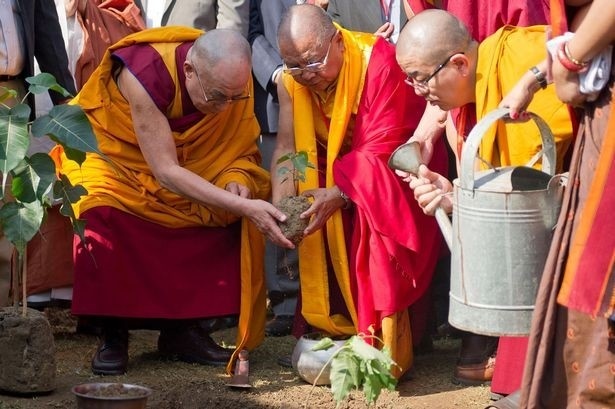
Course Description
This course will focus on ways that Buddhism might contribute to changing minds and actions, by countering mistaken views, modeling ethical behavior, and promoting social resilience. We will survey the great range of issues involved with climate change, such as the treatment of nonhuman animals, eco-justice, economic theory, consumerism, the development of virtues, contemplative exercises, working with troubling emotions, ecological education, and eco-activism in Asia and the West. The world needs people who think, speak and act with a firm grasp of reality and with compassion for all living beings, does it not?
According to Buddhism, the root of the environmental crisis, the greatest threat to life in hundreds of millions of years, is a crisis of mind. The mentality of the modern world is built on the fiction that we are autonomous individuals, separate from our fellow humans, from the rest of nature, and from the cosmos as a whole. This perception is not only incorrect but leads to most of the suffering we experience—anxiety, envy, anger, and frustration—and to greed and hatred, which causes suffering for others as well.
Buddhism’s relevance to the environmental crisis lies in its critique of modernity and its methods to change minds. It provides a way that, without rejecting the modern world, one can return to a mode of perception that was common to our ancestors and is preserved among the planet’s shrinking indigenous communities. It provides a path to liberation from acquisitiveness and to understand how our desires affect other people and things. In addition, climate change activism has been seen by Buddhists as an opportunity for spiritual practice. Thus, although protection of the environment is not a Buddhist goal per see, Buddhist teachings about the development of insight and virtue lead in that direction.

Course Modules
Module 1 — Countering Mistaken Views
Module 2 — Countering Mistaken Views/Modeling Ethical Behavior
Module 3 — Modeling Ethical Behavior
Module 4 — Promoting Social Collaboration
Students Will Receive:
- 4 Video + Audio lectures (90 min)
- 4 Prerecorded Q&A sessions (90 min)
- 4 BS Credits
- 12 Hours of CE credit with YA
- Course Syllabus (PDF)
- Weekly Readings (PDF)
- 4 Multiple Choice Quizzes
- Yogic Studies Certificate (PDF)
- Access to Yogic Studies Community
Dr. Daniel Cozort
Professor Emeritus of Religion at Dickinson College in Carlisle, Pennsylvania
Dr. Daniel Cozort retired from Dickinson College in June 2021, having taught for 37 years in many areas, but specializing in Tibetan Buddhism.
A native of North Dakota, Dr. Cozort graduated from Brown University, where he focused on Christian theology and ethics but encountered Buddhism through the Providence Zen Center. At the University of Virginia, as a student of Dr. Jeffrey Hopkins, he began his study with Tibetan lamas. He did a year of fieldwork in India, traveling broadly and staying in Tibetan monasteries.
In his teaching career, he created over forty courses, but he also curated art exhibits, directed study abroad programs in South India and in England, and made a film about sand mandalas. He is the author of six books, including Highest Yoga Tantra, Buddhist Philosophy, and Unique Tenets of the Middle Way Consequence School, as well as book chapters and articles. For thirteen years, he was the Editor of the Journal of Buddhist Ethics. His most recent book is the Oxford Handbook of Buddhist Ethics (2018). He is currently compiling a new sourcebook for courses on Buddhism and climate change.

This course is eligible for 12 hours of Continued Education (CE) credits with Yoga Alliance

Stay Informed
Sign up for the Yogic Studies mailing list to find out first about upcoming courses, podcast episodes, promotions, events, and the latest research delivered straight to your inbox.

